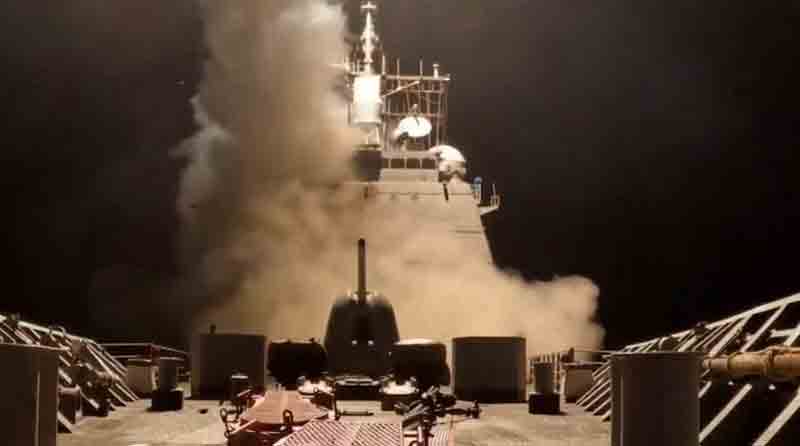The United States will persist in its military actions against Yemen‘s Houthis until they cease their assaults on maritime vessels, stated the U.S. defense secretary on Sunday. This announcement comes as the Iran-aligned group indicated a potential escalation in response to recent lethal U.S. airstrikes. According to the Houthi-run health ministry, these airstrikes resulted in the deaths of at least 53 individuals, marking the largest U.S. military operation in the Middle East since President Donald Trump assumed office in January. A U.S. official informed Reuters that this military campaign could extend over several weeks.
Houthi leader Abdul Malik al-Houthi declared on Sunday that his forces would target U.S. ships in the Red Sea as long as the U.S. continues its offensive in Yemen. “If they persist in their aggression, we will escalate our response,” he stated during a televised address. The political bureau of the Houthi movement condemned the airstrikes as a “war crime,” while Moscow called on Washington to halt its military actions.
On Sunday, the Houthi military spokesperson claimed, without providing evidence, that the group had launched ballistic missiles and drones at the U.S. aircraft carrier USS Harry S. Truman and its accompanying warships in the Red Sea as retaliation for the U.S. strikes.
U.S. warplanes intercepted 11 Houthi drones on Sunday, none of which approached the Truman, according to a U.S. official. Additionally, U.S. forces monitored a missile that landed off the coast of Yemen, which was not considered a threat, the official reported.
U.S. Defense Secretary Pete Hegseth told Fox News’ “Sunday Morning Futures”: “The moment the Houthis agree to stop targeting our ships, we will cease our drone operations. This campaign will conclude, but until that happens, it will continue without relent.” He emphasized, “This is about halting attacks on assets in that vital waterway to restore freedom of navigation, a fundamental national interest for the United States, and Iran has been supporting the Houthis for far too long. They need to back off.”
The Houthis, who have gained control over a significant portion of Yemen in the last ten years, announced last week their intention to resume attacks on Israeli vessels navigating the Red Sea unless Israel lifts its blockade on aid to Gaza.
Following the onset of Israel’s conflict with Hamas in late 2023, the Houthis conducted numerous assaults on maritime targets, claiming they were acting in solidarity with the Palestinian people in Gaza. Former President Trump also urged Iran, the primary supporter of the Houthis, to cease its backing of the group immediately. He warned that if Iran posed a threat to the United States, “America will hold you fully accountable, and we won’t be gentle about it!”
IRAN CAUTIONS THE US AGAINST ESCALATION
In reaction, Hossein Salami, the commander of Iran’s Revolutionary Guards, asserted that the Houthis operate independently. He cautioned adversaries that Iran would respond decisively and destructively if any threats were executed, as reported by state media.
United Nations Secretary-General Antonio Guterres called for “utmost restraint and a halt to all military operations” in Yemen, emphasizing that any further escalation could exacerbate cycles of retaliation, destabilizing both Yemen and the broader region, and worsening the already critical humanitarian crisis, according to his spokesperson.
U.S. Secretary of State Marco Rubio stated on CBS News’ “Face the Nation” that the Houthis would not possess the capability to conduct such actions without Iranian support. He conveyed a message to Iran, warning that continued assistance to the Houthis would make them complicit in the attacks on naval vessels and global shipping.
Russian Foreign Minister Sergei Lavrov reached out to Rubio, advocating for an “immediate cessation of hostilities and the necessity for all parties to engage in political dialogue,” as reported by Moscow. According to Anees Alsbahi, spokesperson for the Houthi-run health ministry, five children and two women were among the 53 fatalities resulting from U.S. airstrikes, with an additional 98 individuals reported injured.
The Pentagon has not yet provided a response to inquiries regarding allegations of civilian casualties, and Reuters has been unable to independently verify these claims. Residents in Sanaa reported that the airstrikes targeted an area known to be home to several members of the Houthi leadership.
“The explosions were intense and shook the neighborhood like an earthquake, frightening our women and children,” stated a local resident named Abdullah Yahia.
In Sanaa, a crane and bulldozer were employed to clear debris at one location, while individuals sifted through the rubble with their hands. Medics at a hospital treated the injured, including children, and several bodies were seen laid out in a yard, covered with plastic sheets, according to footage from Reuters. Witnesses also reported that strikes targeted Houthi military installations in the city of Taiz on Sunday.
HOUTHIS’ RED SEA ATTACKS DISRUPT GLOBAL TRADE ROUTE
Additionally, a strike on a power station in Dahyan resulted in a power outage, as reported by Al-Masirah TV early Sunday. Dahyan is known as a meeting place for Abdul Malik al-Houthi, the elusive leader of the Houthis.
The Houthi assaults on maritime shipping have significantly impacted global trade and prompted the U.S. military to initiate an expensive operation to intercept missiles and drones. The group had paused its campaign following a ceasefire agreement between Israel and Hamas in Gaza in January. However, on March 12, the Houthis declared that their threat to target Israeli vessels would remain until Israel allowed the resumption of aid and food deliveries to Gaza.
Discover more from Defence Talks | Defense News Hub, Military Updates, Security Insights
Subscribe to get the latest posts sent to your email.





